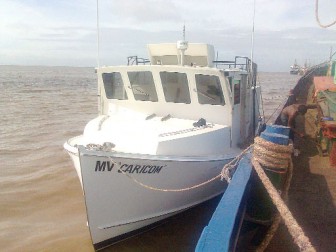Following last week’s joint operation between the local anti-narcotics bodies and their colleagues in Barbados which led to a huge drug bust in the island, there have been calls for the local Drug Enforcement Unit (DEU) of the Guyana Revenue Autho-rity to be strengthened.
According to sources within the GRA, early last month the recently established DEU was given additional functions by the authority to stem the drug trade, but while the unit was provided with the additional powers, it was not equipped to deal with some of the scenarios it might encounter.

Efforts by this newspaper to obtain a comment from Commissioner General of the GRA, Khurshid Sattaur on Friday were futile, as staff said that he was unavailable and calls to his mobile phone went unanswered.
In the recent Barbados drug bust, a source told Stabroek News that the Customs Anti-Narcotics Unit (CANU) was called in to assist the DEU after it was recognized that the latter was not adequately provided with the necessary personnel and equipment to handle the situation.
The source noted that the DEU officers were called in to search the vessel at the centre of the drug bust, the MV Caricom, which is registered to a city businessman, but the unit requested additional assistance from CANU in carrying out the search. The move was made with CANU providing support to the DEU since the former does not have the authority to carry out operations at the wharves as a first option.
The source noted that at the moment, the DEU comprises a mere four officers who are expected to undertake drug enforcement operations around the country, and while the officers may have had training from their previous places of employment as most of them are former police and army officers, no formal training was ever undertaken within the context of their current job portfolio.
The officers within the DEU, which is based at Customs House on Main Street in the city, are tasked with travelling to various locations, but they have to obtain transportation from the individuals whose goods have to be inspected since the unit was not provided with vehicles.
As a result, the unit’s personnel would be “on a wild goose chase” the source noted, since the individual whose goods had to be inspected would be in a prime position to determine the outcome of such operations.
It was observed recently by persons within the GRA that there appeared to be a deliberate attempt by those in authority not to upgrade the Drug Enforcement Unit. At the moment the unit lacks basic office equipment as well as human resources, and the source added that there had been calls by the officers within the DEU for additional persons to be hired, since on many occasions the four staff members were tasked with working in excess of 24 hours.
Recently, it was said, there was a transfer of functions from the former Law Enforcement and Investigative Division (LEID) which was disbanded within the past several months, to the newly formed DEU, but officials within the new body had not been “properly informed” of their functions as they had not received any training to carry out the duties assigned to them.
However, it was noted by a source that the officers within the unit had been relying on their personal experience and expertise, as well as the experience of their colleagues in CANU which was better equipped and trained.
According to the annual International Narcotics Control Strategy Report (INCSR) which was issued last month, Guyana has a drug enforcement presence at the major international airport, post offices, and to a lesser extent at the port of Georgetown.
The majority of drug enforcement assets are centred in the capital, although progress has been made in building capacity in the interior. The three major agencies involved in anti-drug efforts are the Guyana Police Force (GPF), CANU, and the Guyana Defence Force (GDF). Of the three, CANU has the most institutional knowledge and drug enforcement experience.
Guyana’s efforts to stem the drug trade had been criticized in the past by the United States authorities, although the government has maintained that it has been carrying out its objectives as outlined in master plans to curtail the flow of illicit substances.




